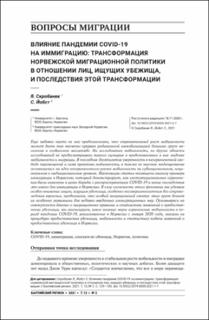| dc.contributor.author | Skrobanek, Jan | |
| dc.contributor.author | Jobst, Solvejg | |
| dc.date.accessioned | 2022-03-30T11:13:51Z | |
| dc.date.available | 2022-03-30T11:13:51Z | |
| dc.date.created | 2022-01-31T11:01:49Z | |
| dc.date.issued | 2021 | |
| dc.identifier.issn | 2079-8555 | |
| dc.identifier.uri | https://hdl.handle.net/11250/2988568 | |
| dc.description.abstract | Until just a year ago, hardly anyone believed that the increasingly unrestrained growth in mobility could be so abruptly interrupted by a radical immobilisation of large population groups. Neither mobility studies nor other research fields had foreseen this kind of scenario in their mobility and migration models. In the past decades, the belief in unconstrained mobility, as well as the practice of mobility and its scientific modelling, relied on the idea of unbounded growth at the sub-national, national and supra-national level. The article focuses on immigration to Norway, showing how institutional constraints were used to deal with the spread of COVID-19 and how they affected immigration to the country. Due to complexity reasons, we focus exclusively on the situation of asylum seekers, giving additional attention to unaccompanied minors. These groups’ migration status is assumed to make them especially susceptible to the newly established immigration measures. Drawing upon a combined focus of data on migration regulations and asylum application statistics, we examine what impact mobility-related COVID-19 measures implemented in Norway since January 2020 had on asylum procedures, asylum mobility and asylum applications in Norway. | en_US |
| dc.description.abstract | Еще недавно никто не мог предположить, что стремительный рост мобильности может быть так внезапно прерван радикальной иммобилизацией больших групп на¬селения в глобальном масштабе. Ни исследования мобильности, ни другие области исследований не предусматривали такого сценария в представленных в них моделях мобильности и миграции. В последние десятилетия уверенность в неограниченной сво¬боде перемещений и сама практика мобильности, а также ее научное моделирование основывались на идее неограниченного роста мобильности на субнациональном, наци¬ональном и наднациональном уровнях. Настоящая статья посвящена анализу примера иммиграции в Норвегию, который демонстрирует, как институциональные ограниче¬ния были изменены в целях борьбы с распространением COVID-19 и какие последствия это имело для иммиграции в Норвегию. В силу сложности этого феномена мы уделяем особое внимание лицам, ищущим убежища, особенно несовершеннолетним без сопрово¬ждения взрослых, предполагая, что особый миграционный статус этих групп делает их особенно уязвимыми для недавно введенных иммиграционных мер. Основываясь на совокупности данных о миграционных правилах и статистике заявлений о предостав¬лении убежища, мы анализируем, какое влияние меры ограничения мобильности в пе¬риод пандемии COVID-19, реализованные в Норвегии с января 2020 года, оказали на процедуры предоставления убежища, мобильность и статистику подачи заявлений о предоставлении убежища в Норвегии. | en_US |
| dc.language.iso | eng | en_US |
| dc.rights | Navngivelse 4.0 Internasjonal | * |
| dc.rights.uri | http://creativecommons.org/licenses/by/4.0/deed.no | * |
| dc.title | The Impact Of Covid-19 On Immigration: The Transformation Of Norwegian Migration Policy On Asylum Seekers | en_US |
| dc.title.alternative | Влияние Пандемии Covid-19 На Иммиграцию: Трансформация Норвежской Миграционной Политики В Отношении Лиц, Ищущих Убежища,И Последствия Этой Трансформации | en_US |
| dc.type | Journal article | en_US |
| dc.description.version | publishedVersion | en_US |
| cristin.ispublished | true | |
| cristin.fulltext | original | |
| dc.identifier.doi | 10.5922/2079-8555-2021-2-7 | |
| dc.identifier.cristin | 1994371 | |
| dc.source.journal | Baltic Region | en_US |
| dc.source.pagenumber | 129-145 | en_US |
| dc.identifier.citation | Baltic Region. 2021, 13 (2), 129-145. | en_US |
| dc.source.volume | 13 | en_US |
| dc.source.issue | 2 | en_US |

